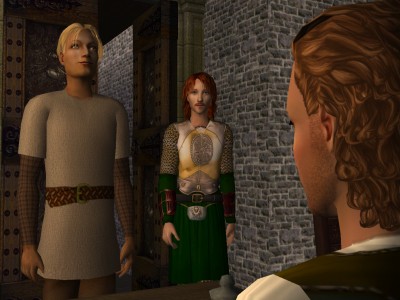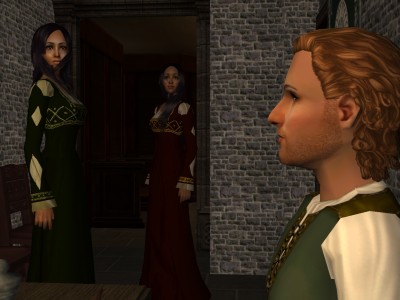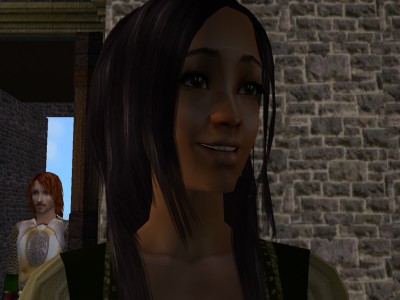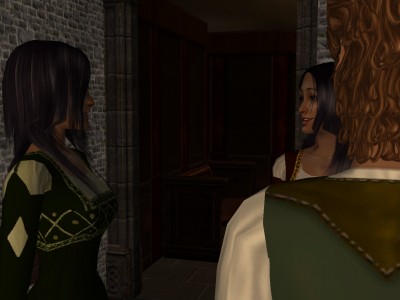
Ethelwyn was, most uncharacteristically, not paying attention to the complaint of his master’s tenant. He could not stop rubbing his fingertips over the knobby scabs on the back of his neck, and every time he touched them he thought again of what they meant.
Ethelwyn was no longer “the man who fell in the moat”. Ethelwyn was now a hero: “the man who saved Sir Egelric’s son from a vicious dog.”
He did not think he deserved the adulation that went with the second title any more than he had the mockery that had come with the first. If he’d had the time to think, he might not have done what he did—or he would have hesitated before doing his duty, and Gils might have been badly mauled or even killed.
He had not thought at all. At the first snarling lunge of the strange dog, he had thrown himself between them, wrapped his body around the boy’s, and given up his own back and neck and curly head to the dog.
The dog, visibly some mongrel cross between a deerhound and a mastiff, had known to go for his neck. Fortunately he had not been true to the race of either, for at the first taste of blood he had let go of his prey and run yelping away, careening between the legs of the men who had assembled to beat him with whatever blunt implements a castle courtyard had to hand.

Thus Ethelwyn had only a neat set of puncture marks on the back of his neck for his pains, as well as the sobbing gratitude of his lady, the cooing solicitude of her two young friends, and the congratulations of everyone he met.
Nearly a week later he was still running into people who had not yet exclaimed over him, and he was growing tired of the routine. All he knew of heroism was that it was nearly as embarrassing to be the center of attention for something fine as for something foolish, and that in real life hesitant ladies did not suddenly come to their senses when they heard of a disappointed suitor’s brush with death. Therefore he sorely wished the whole affair had never happened.

He wished it most when he touched the scabs on his neck. The wounds were healing nicely, and the scars would be faint and covered by his curls in any case. That was not what bothered him.
It was true that Sir Egelric always teased him for thinking every little bump a tumor, every stomachache a fatal colic, every sneeze the first sign of a slow, wasting death. But this was a serious matter, and Ethelwyn believed he had a right to worry.
All of the men had been satisfied to say that they must now have identified the dog that had been killing the sheep in the past months. To them, any dog ill-bred enough to attack sheep was a dog capable of attacking a little boy.
But Ethelwyn could not forget that no dog had ever so much as growled at Wulf or Gils. All of the animals, from baby mice up to warhorses, loved Egelric’s little half-elf boys. To Ethelwyn’s mind, any dog capable of attacking Gils could only have been mad.

Fortunately, perhaps, for him, before his reflections could grow too somber and before his master’s tenant had noticed that his mind was elsewhere, the guard opened the great door, and in entered the two greatest distractions that the Lord had ever created—apparently solely for his sake.
And fortunately for him, he was safe behind his desk, and he immediately picked up his quill and attempted to look busy, or at least oblivious to chattering young ladies.
Catan and Flann came in with their maids, and he was certain all four of them tried slipping him a wink or a sly smile as they went by. He knew better than to look up before they had gone far enough to turn their backs to him. When he did see their backs, however, he had a shock.

“Ladies!” he gasped, and the two girls stopped and turned to smile questioningly at him. Their hair was not streaming with water, but it was soaked through, and wet enough for stray slender locks to cling to their cheeks.
His first thought was that they had fallen into the moat, and he immediately blushed as hotly as if he had said it aloud. Sir Egelric’s castle did not, after all, have a moat. But he could not figure out what other catastrophe might have befallen them—their gowns appeared quite dry, and the heads of the maids who had disappeared down the corridor had been dry as well.

“What happened to you?” he asked, after their amusement had grown to an unbearable level.
“Nothing happened to us!” Catan said. “We went swimming!”
“Swimming? Swi… Oh my God!”

The guard and the farmer were exchanging grins, and he could not allow that either.
“Come with me!”






Nownow... What is wrong with swimming?
And when is Mouse going to run in and be glad he's still alive?
Those two should really find each other in a state of great dispair, clinging to each other to find comfort (think the pit with the elf...) and then figuring out their whole disagreement is based on a misunderstanding.
I have spoken. (sorry, to many court-time today...)